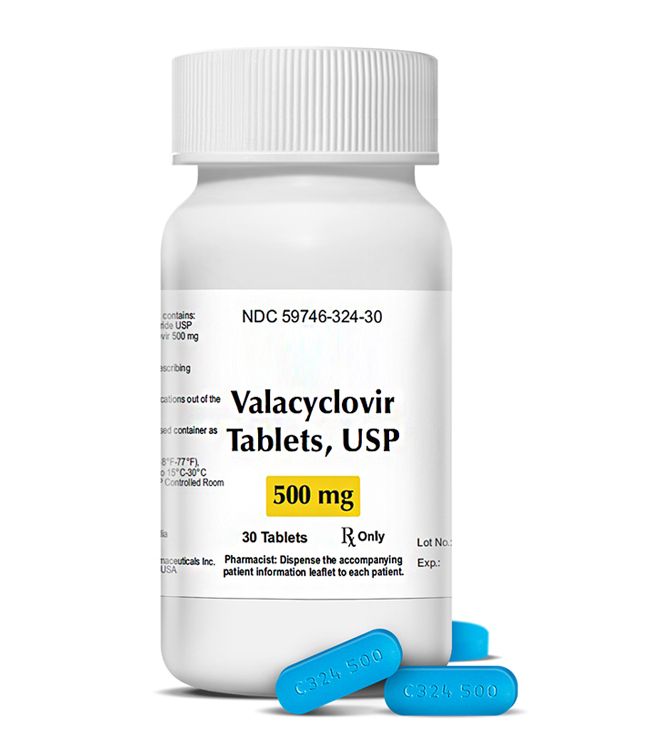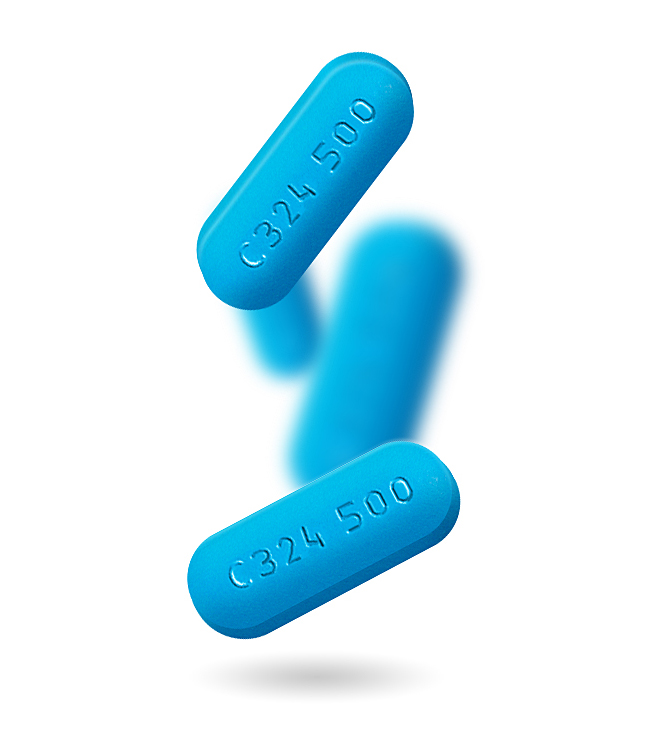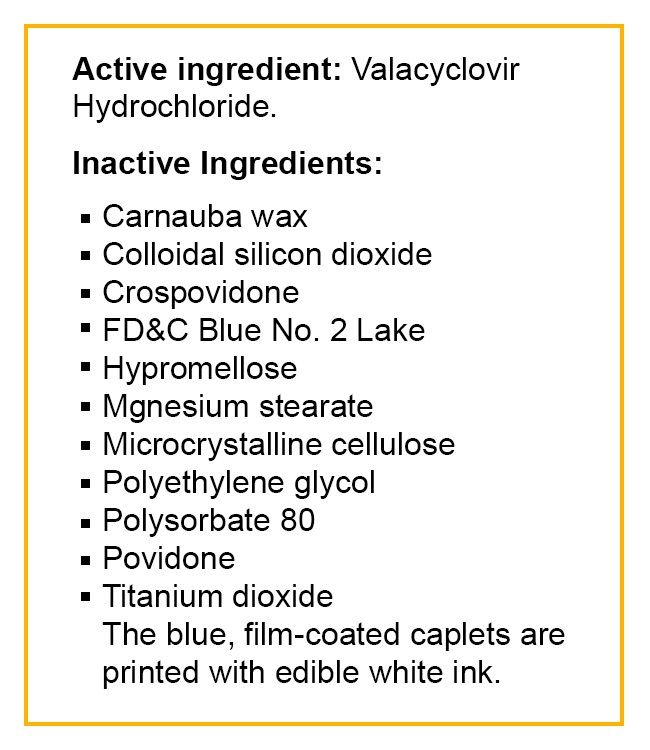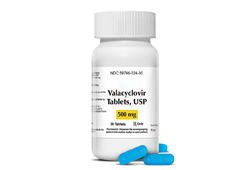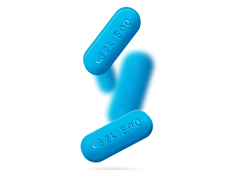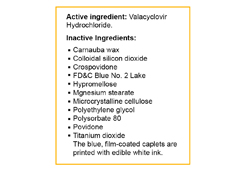- Home
- Sexual Health
- Valacyclovir
In-Stock
Valacyclovir Generic Valtrex is a prescription medication to treat genital herpes, cold sores, and adult shingles.
Manufacturer
Camber PharmaceuticalsDosage
500 MGQuantity
Your Savings
Maximum Doses
Cost Per Dose
Price
$Valacyclovir Prescription Medication Prescribed by Healthymale.com
Valacyclovir is a popular antiviral drug. It is used to treat or manage diseases caused by specific types of viruses. It is used to treat cold sores that usually occur around the mouth and shingles mainly caused by herpes zoster. The two infections are in adults, but the drug can also be used in children. Notably, in children, it is used to treat chickenpox whose causative agent is Varicella zoster and cold sores mainly caused by herpes simplex.
Valacyclovir is used to manage genital herpes outbreaks as well. It can be used to minimize the frequency rate especially for individuals who experience frequent outbreaks.
Valacyclovir functions by terminating the growth of certain viruses. Therefore, it does not get rid of the viruses totally. The viruses, for example, the herpes virus continues to reside in the body causing outbreaks when favorable conditions are met.
Valacyclovir, therefore, minimizes the duration or the severity of the outbreaks. It aids in healing the sores rapidly, preventing new sores from emerging and forming as well as reducing pain or any associated itch. The drug may also assist in reducing the duration of the pain that occurs in the aftermath of healing sores.
How to use this drug
Valacyclovir is orally taken since it comes as a tablet. To treat shingles, a person should take it every eight hours which translates to three times a day for a whole week, that is, seven days. It is usually taken two times a day, for example, in the morning and at night for five days, to treat genital herpes.
It is advisable to follow the directions found on the prescription label carefully. If you happen to find any section that you do not understand, always ask your doctor to provide an extensive explanation. It is always recommended to use this medication as soon as you notice any symptoms.
It also recommended continuing taking valacyclovir even after you start feeling well. Hence, you should not discontinue taking the medication without consulting your doctor first.
Before taking valacyclovir
In the process of decision-making, remember to ask your doctor about the side effects. The risks of using the drug must be considered and evaluated properly. It helps determine if the damage it may cause would be more than the good. Your doctor should help when making such a decision. Before using valacyclovir, the following facts should be considered
Valacyclovir is used to treat the outbreaks of genital herpes but does not get rid of the virus itself. Therefore, the medication will not stop the spread of the virus. You can still infect other people even when you are on the drug because herpes infections are quite contagious.
To prevent the spread of genital herpes, you can use protection, particularly a latex condom during sexual intercourse. Remember to keep the infected areas from coming into contact with other people. Also, remember to wash your hands thoroughly after touching an infected area. It helps in the prevention of passing the virus to other people.
Allergic Reactions
If you have used this medication and had an allergic reaction, then you should inform your doctor. If you have allergic reactions to other types of drugs also notify your doctor. If you also have other forms of allergies, for examples, to certain types of foods, animals, preservatives, or dyes, do not forget to mention such details to your doctor. Remember to carefully read the ingredients on the package or label of non-prescription medicine or products.
Geriatric
Recent studies performed have not found any geriatric-specific issues that would potentially limit the effect of the medication in the elderly. However, the elderly are more susceptible to kidney diseases due to their age. In such a case, the valacyclovir dose given to such elderly patients requires an adjustment.
The drug interactions
Due to drug interactions, certain medicines are never used together at all. However, in other cases, one can be allowed to use two different medicines even if there is a possibility of an interaction occurring. If an interaction occurs then your doctor may find it necessary to change the dose or utilize other precautions.
When taking valacyclovir, it is essential to inform your healthcare professional if you are taking any of the drugs mentioned below. Taking valacyclovir with any other medicine mentioned below is not usually recommended. However, in some instances, it may be deemed necessary. If both drugs are to be taken together, your doctor may alter the dose or change the frequency of usage of one or both the medicines.
Foscarnet or Tolvaptan
Using valacyclovir with any of the two may enhance the risk of specific side effects even if it may be the ideal treatment. Hence, alterations are necessary.
Fosphenytoin, Valproic Acid or Phenytoin
Side effects
If any the following symptoms become severe, please consult your doctor
Headache
Vomiting
Constipation
Diarrhea
If any of the following side effects appear, contact your doctor immediately
Confusion
Fever
Itching
Yellowness of the eyes or skin
Rash
Blood in urine
If a more severe side effect develops, both you and your doctor may report the case to the Food and Drug Administrations. Send a report by phone (1-800-332-1088) or through http://www.fda.gov/Safety/MedWatch.
Important Patient Information
VALACYCLOVIR - ORAL (val-uh-SYE-klo-veer) COMMON BRAND NAME(S): ValtrexIMPORTANT: HOW TO USE THIS INFORMATION: This is a summary and does NOT have all possible information about this product. This information does not assure that this product is safe, effective, or appropriate for you. This information is not individual medical advice and does not substitute for the advice of your health care professional. Always ask your health care professional for complete information about this product and your specific health needs.
USES: Valacyclovir is used to treat infections caused by certain types of viruses. In children, it is used to treat cold sores around the mouth (caused by herpes simplex) and chickenpox (caused by varicella zoster). In adults, it is used to treat shingles (caused by herpes zoster) and cold sores around the mouth. Valacyclovir is also used to treat outbreaks of genital herpes. In people with frequent outbreaks, this medication is used to reduce the number of future episodes. Valacyclovir is an antiviral drug. It stops the growth of certain viruses. However, it is not a cure for these infections. The viruses that cause these infections continue to live in the body even between outbreaks. Valacyclovir decreases the severity and length of these outbreaks. It helps the sores heal faster, keeps new sores from forming, and decreases pain/itching. This medication may also help reduce how long pain remains after the sores heal.
HOW TO USE: Read the Patient Information Leaflet if available from your pharmacist before you start taking valacyclovir and each time you get a refill. If you have any questions, ask your doctor or pharmacist. Take valacyclovir by mouth with or without food as directed by your doctor. Drink plenty of fluids while taking this medication to lower the chance of side effects. The dosage and length of treatment are based on your type of infection, medical condition, and response to treatment. For treating chickenpox in children, the dosage is also based on weight. This medication works best when started at the first sign of an outbreak, as directed by your doctor. It may not work as well if you delay treatment. For shingles or chickenpox, start taking valacyclovir at the first symptom or as soon as possible after the rash appears. For cold sores or genital herpes, start taking this medication at the first sign or as soon as you feel tingling, itching, or burning. Valacyclovir works best when the amount of medicine in your body is kept at a constant level. Take this drug at evenly spaced intervals. To help you remember, take it at the same time(s) each day. Continue to take this medication until the full prescribed amount is finished. Do not change your dose, skip any doses, or stop this medication early without your doctor's approval. Tell your doctor if your condition lasts or gets worse.
SIDE EFFECTS: Nausea, stomach pain, headache, or dizziness may occur. If any of these effects last or get worse, tell your doctor or pharmacist promptly. Remember that this medication has been prescribed because your doctor has judged that the benefit to you is greater than the risk of side effects. Many people using this medication do not have serious side effects. Tell your doctor right away if you have any serious side effects, including: signs of kidney problems (such as a change in the amount of urine, unusual back/side pain), mental/mood changes (such as agitation, confusion, hallucinations), shaky/unsteady movement, unusual tiredness, fast heartbeat, easy bruising/bleeding, new fever, bloody/dark urine, severe stomach/abdominal pain, yellowing eyes/skin. Get medical help right away if you have any very serious side effects, including: sudden vision changes, trouble speaking, loss of consciousness, seizures. A very serious allergic reaction to this drug is rare. However, get medical help right away if you notice any symptoms of a serious allergic reaction, including: rash, itching/swelling (especially of the face/tongue/throat), severe dizziness, trouble breathing. This is not a complete list of possible side effects. If you notice other effects not listed above, contact your doctor or pharmacist. In the US - Call your doctor for medical advice about side effects. You may report side effects to FDA at 1-800-FDA-1088 or at www.fda.gov/medwatch. In Canada - Call your doctor for medical advice about side effects. You may report side effects to Health Canada at 1-866-234-2345.
PRECAUTIONS: Before taking valacyclovir, tell your doctor or pharmacist if you are allergic to it; or to acyclovir; or if you have any other allergies. This product may contain inactive ingredients, which can cause allergic reactions or other problems. Talk to your pharmacist for more details. Before using this medication, tell your doctor or pharmacist your medical history, especially of: kidney problems, immune system problems. This drug may rarely make you dizzy. Alcohol or marijuana (cannabis) can make you more dizzy. Do not drive, use machinery, or do anything that needs alertness until you can do it safely. Limit alcoholic beverages. Talk to your doctor if you are using marijuana (cannabis). Before having surgery, tell your doctor or dentist about all the products you use (including prescription drugs, nonprescription drugs, and herbal products). Tell your health care professional that you are using valacyclovir before having any immunizations/vaccinations (such as vaccines against the varicella virus). Older adults may be more sensitive to the side effects of this drug, especially mental/mood changes (such as confusion, agitation) and kidney problems (such as a change in the amount of urine). Cold sores can spread easily. Avoid close physical contact with others (such as kissing) during an outbreak until the cold sores have completely healed. Try not to touch the cold sore. If you do, wash your hands afterward. Valacyclovir does not prevent the spread of herpes. To lower the chance of giving genital herpes to your partner, do not have sexual contact during an outbreak or if you have symptoms. You can spread genital herpes even if you do not have symptoms. Always use an effective barrier method (latex or polyurethane condoms/dental dams) during all sexual activity. Consult your doctor or pharmacist for more details. During pregnancy, this medication should be used only when clearly needed. Discuss the risks and benefits with your doctor. This medication passes into breast milk, but is unlikely to harm a nursing infant. Consult your doctor before breast-feeding.
DRUG INTERACTIONS: Drug interactions may change how your medications work or increase your risk for serious side effects. This document does not contain all possible drug interactions. Keep a list of all the products you use (including prescription/nonprescription drugs and herbal products) and share it with your doctor and pharmacist. Do not start, stop, or change the dosage of any medicines without your doctor's approval. Some products that may interact with this drug include: other drugs that may cause kidney problems (including nonsteroidal anti-inflammatory drugs-NSAIDs such as ibuprofen, naproxen). Valacyclovir is very similar to acyclovir. Do not use medications containing acyclovir while using valacyclovir.
OVERDOSE: If someone has overdosed and has serious symptoms such as passing out or trouble breathing, call 911. Otherwise, call a poison control center right away. US residents can call their local poison control center at 1-800-222-1222. Canada residents can call a provincial poison control center. Symptoms of overdose may include: change in the amount of urine, extreme tiredness, mental/mood changes, loss of consciousness, seizures.
MISSED DOSE: If you miss a dose, take it as soon as you remember. If it is near the time of the next dose, skip the missed dose. Take your next dose at the regular time. Do not double the dose to catch up.
STORAGE: Store at room temperature away from light and moisture. Do not store in the bathroom. Keep all medications away from children and pets. Do not flush medications down the toilet or pour them into a drain unless instructed to do so. Properly discard this product when it is expired or no longer needed. Consult your pharmacist or local waste disposal company. or local waste disposal company.
Prescribing Information
This product information is intended for United States residents only. Before prescribing, please refer to the patient information. You can view the document and also download it on your computer. You may also consider printing out a copy for yourself.
• View US Prescribing Information - PDF VersionTo view the PDF document, you need Adobe Acrobat Reader which you can download for free here.
